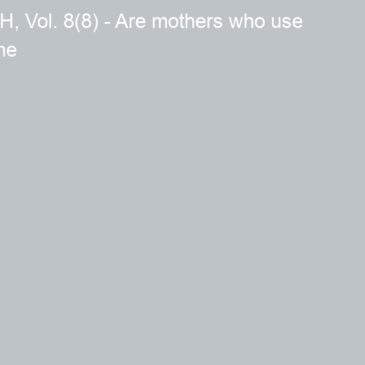Previous studies have shown that children exposed prenatally to cocaine are more aggressive later on than other children (Sood et al, 2005). It is possible that a mother’s cocaine use during her pregnancy is associated with her aggressive behavior toward her child later on, and that this maternal aggression in turn plays a role in later childhood aggression. This week’s STASH reviews a study that investigates the association between prenatal cocaine use and maternal aggression during the early years of a child’s life and the early relationship between maternal and childhood aggression (Eiden, Schuetze, Colder & Veira, 2011).
Methods
- Researchers recruited new mothers from two hospitals serving a mainly low-income population. The researchers determined maternal cocaine use status by a combination of self-report, hair-sample and urine toxicology 4 – 8 weeks after delivery.
- Laboratory tests revealed that 119 mothers used cocaine during pregnancy.
- For every cocaine-positive mother, the researchers recruited one non-cocaine using mother matched on maternal education, maternal race/ethnicity, and infant gender.
- The final sample consisted of 220 mother-child dyads, 119 cocaine positive and 101 cocaine negative. Seventy-four percent of mothers were African American and 60% were single. Forty-nine percent of infants were males.
- Trained observers blind to cocaine status coded mother-child behavior for key variables on two occasions:
- 13 months after delivery, researchers observed mother-child 10 min. free play and coded maternal negative affect by rating variables such as hostile tone of voice, criticism, and angry mood on 1 – 5 scale.
- 24 months after the initial assessment, researchers coded maternal and child aggression during multiple 5 – 10 minutes sessions (e.g., free play, structured play, cleaning the room, eating snack etc.). The coderes rated duration, intensity (1 – 4 scale) and number of aggressive episodes that included physical and verbal aggression toward a person or an object.
Results
- Mothers who used cocaine during pregnancy displayed more negative affect 13 months after delivery (M = 4.66, SD = .80) than mother who did not use cocaine (M = 4.36, SD = .54; F = 7.84, p <.01).
- As shown in Table 1, cocaine-using mothers were also more aggressive toward their children two years later (F = 2.93, p <.05). These results did not change when controlled for education and other substance use or when children in foster care were excluded.
- The effect of cocaine during pregnancy on maternal aggression two years later was mediated by maternal negative affect coded at the 13-month session (B = .36, p <. 05).
- Maternal and child aggression 24 months after delivery were strongly linked (r = .53; p < .05).
- However, cocaine status group was not associated with child aggression two years later.
|
Non-cocaine group |
Cocaine group |
F |
|
| Duration of maternal aggressive episodes (in seconds)* |
47.74 (75.44) |
89.20 (109.70) |
7.86 |
| Number of maternal aggressive episodes* |
5.04 (4.19) |
7.34 (6.05) |
8.23 |
| Rated intensity of aggressive episodes (1 – 4 scale) * |
1.63 (1.09) |
2.09 (1.34) |
5.9 |
Figure. Mean (SD) group differences in maternal aggression toward 24-month-olds. *p < .01.
Limitations
- The authors use multiple methods to determine prenatal cocaine use, however none of this method guarantees actual use 4 – 8 weeks before.
- It is not possible to conclude that cocaine use caused maternal negative affect at 13 months and maternal aggression at 24 months because cocaine use could be a marker for other variables linked to aggression not measured in this study.
- The observers assessed mother-child interactions in an artificial context. Mothers might have attempted to alter their behavior for the coders.
Conclusion
Mothers who used cocaine during pregnancy displayed more negative affect toward their children 13 months later. This in turn, was positively associated with duration, number of episodes, and intensity of aggression toward their 24-month old toddlers. In addition, the results showed a significant positive association between mother and child aggression. Further studies should explore the direction of influence for child and mother aggression. This study has demonstrated that it is important to assess mother’s aggression and affect and include them as potential variables in models that predict the effects of cocaine use on childhood aggression.
Also, on a practical level, cocaine use during pregnancy may be used as an indicator of need for child abuse prevention efforts.
-Julia Braverman
What do you think? Please use the comment link below to provide feedback on this article.
References
Sood, B. G., Nordstorm B. B., Covington, C. Sokol, R. J.,Ager, J., Janisse, J. et al. (2005). Gender and alcohol moderate caregiver reported child behavior after prenatal cocaine. Neurotoxicology Teratoloty, 27, 191-201
Eiden, R. D., Schuetze, P., Colder, C.R., & Veira, Y. (2011). Maternal cocaine use and mother-toddler aggression. Neurotoxicology and Teratology, 33, 360-369.




